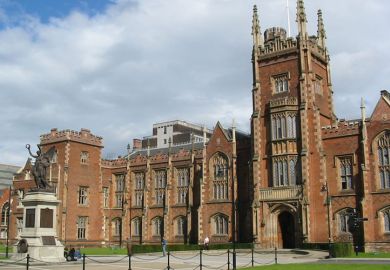The restoration of Northern Ireland’s devolved government has given hope that its higher education difficulties will finally be tackled, but academics have warned that simplifying the debate to be about tuition fees only will leave the historic problems faced by the region’s universities unfixed.
Since the power-sharing agreement between unionist and republican parties was restored earlier this month after three years without a functioning administration, first minister Arlene Foster, leader of the Democratic Unionist Party, has raised the prospect of an increase in tuition fees. The government would look at how universities are funded, potentially as part of a cost-saving measure to Northern Ireland’s budget, she said, and called for tuition fees to be debated “in a positive way”.
However, Sinn Fein’s Michelle O’Neill, the deputy first minister, said that this was “not the way to go”, as it would “build up” barriers to education. “We have to work with universities about how they can be creative and innovative about attracting new funding streams,” she told the BBC.
Tuition fees in Northern Ireland are capped at £4,275, compared with £9,250 in England. The Stormont administration was supposed to make up the difference, but the amount of compensation has significantly reduced as the executive’s budgets have tightened.
The Royal Irish Academy (RIA) has estimated that Northern Ireland’s universities now get around £2,000 less per student than their English counterparts.
The funding cuts have led to Queen’s University Belfast and Ulster University cutting thousands of student places and hundreds of jobs. The RIA said the situation was “unsustainable” if Northern Ireland was to have any hope of becoming a “knowledge-based economy”.
Academics in Northern Ireland agreed that tuition fees were an important factor, but told Times Higher Education that broader solutions were needed.
Gerry McKenna, vice-president of the RIA and former vice-chancellor of Ulster University, said it was “unlikely” the Northern Ireland executive would leave tuition fees as they are and increase central funding to higher education providers, given the current budget limitations.
Therefore, an increase in student fees to levels “comparable with England and Wales, which should be supported by NI-specific income-contingent student loans and maintenance support schemes”, or a slight increase in fees combined with an increase in government subsidy, were more likely options, he said.
Professor McKenna said the main problem was that higher education had been “devoid of any effective oversight” for decades. The “urgently needed” review of funding must also address the “spatial distribution of higher education, the scope for more courses being offered at lower cost via the further education system and the Open University, and the potential for greater cross-border collaboration to offset peripheral disadvantage”, he said.
Deirdre Heenan, professor of social policy at Ulster University, said it was “frustrating that politicians have resorted to soundbites on the easy target of tuition fees”.
She said that if the DUP believed raising tuition fees was a way for the executive to save money, therefore implying it would reduce its contribution, then the problem would remain the same.
“The only chance of prosperity is if we have a skilled workforce, but there is no one in government championing higher education,” she said. “It’s lazy thinking to just tinker around the margins. If there is no long-term budget for universities, they can’t plan for the future.”
Register to continue
Why register?
- Registration is free and only takes a moment
- Once registered, you can read 3 articles a month
- Sign up for our newsletter
Subscribe
Or subscribe for unlimited access to:
- Unlimited access to news, views, insights & reviews
- Digital editions
- Digital access to THE’s university and college rankings analysis
Already registered or a current subscriber?








